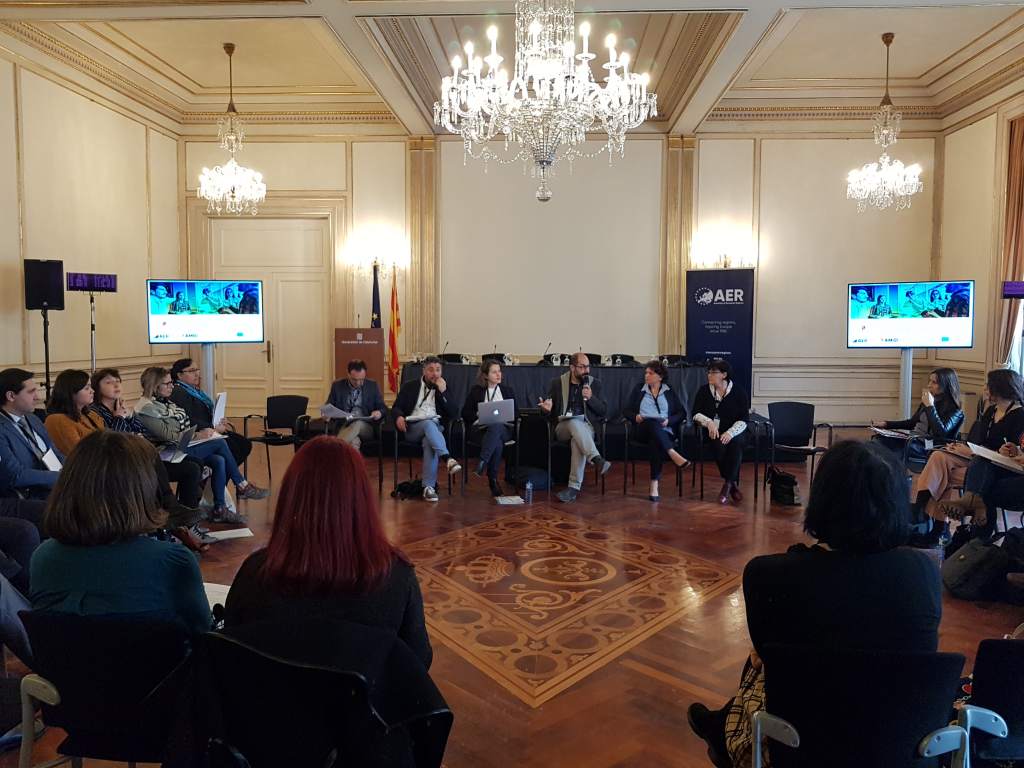 Share this!
Share this!The AER flagship project on migration, AMiD-Access to Services for Migrants with Disabilities, has been running since early 2018.
Soon, the final conference, scheduled in Brussels on 5th November, will present a one-stop-shop of all the project’s products and findings.
AER focused in particular on how to set a common approach toward migrants and refugees with disabilities, improving cooperation among Local Authorities and NGOs.
A series of events with various formats, took place over the last year. That is in line with the interest and commitment that the AER network has brought to migration and migrants, since the “Tampere Declaration on Migration and Integration” in 2008 to the important political statement on “Facing the migration and refugee challenges” adopted at the pic of the refugees crises in 2015.
Kick-Off in collaboration with the Task Force on Migration
Everything started with the debate on migration at the 2018 Autumn Bureau in Gelderland. The debate was the appetizer to introduce the multi-stakeholder and multilevel collaboration. That is the option suggested to overcome the issue to set a common approach among the different actors involved in the process of welcome and support of migrants and migrants with disabilities. AER members engaged in an exchange about the dynamics of migration, the European and global policies, and the funding instruments and programmes already available.
International conference: marking International Migrants Day
The International Migrants Day marked a fundamental step in the evolution of the involvement and discussion of AER members and regional and local authorities from larger Europe.
Hosted by Catalonia Region (ES), participants came to exchange and learn, united in recognition of the vital role played by local and regional authorities in managing diversity and building cohesive societies, improving the lives and opportunities of citizens, and contributing to their social, economic and civic inclusion. This aim was echoed by Laura Corrado of the European Commission’s DG Home who shared the Commissions efforts to bring a multi-level, multi-stakeholder approach to migration policy. Kenneth Johannesson, from Varmland and member of the AMiD CAB – Community Advisory Board, appealed to a social vision of Europe that would combat discrimination in order to ensure that all people have access to “a freedom not from society, but through society.”
Workshop at the Spring Plenaries: examples of the multi-stakeholder approach
The 2019 Spring Plenaries in Orebro (SE) welcomed a workshop under the sign of AMiD. A smaller event, where the perspective of the multi-staholder way have been discussed further. What is the added value to work with organisations that are not public authorities? Agneta Kardos from Timis County, another AMiD CAB member for AER, shared the experience of a non-formalised multi-stakeholder network that involves NGOs working on social care and child protection. Timis County is getting recommendations and knowledge from best-practices from them.
On the other hand, Aleksander Bro from Orebro County presented a consultation process where Public sector and social economy organisations work and talked together on local development. Other examples came up composing a large and various range of experiences. Participants got that the ways to collaborate and involve stakeholders can be different but all efficient and successful.
Project and programmes on migration in AER’s network
The 2019 General Assembly and Spring Bureau in Larnaca (CY) hosted a mixed panel gathering together regional authorities, cities, NGOs and European institutions. Rasoul Nejadmehr, expert on migration from Vastra Gotaland County, talked on the paradox that anti-migrant sentiments strongest in countries with very few migrants. Rasoul Nejadmehr spotted that the problem is the feeling among citizens to be politically disempowered, financially insecure and without social support. That makes citizens most likely to become extremely negative towards migrants and other vulnerable groups.
The good news is there are already examples and resources. ARCi, Italian NGO, brought the great example of JUMA, website were any service helpful to migrants is listed. City of Torino (IT) and the Prisma project proved how fruitful can be the collaboration between a local authority and an NGO, Verba association, specialized in disability. All the positive effects of the collaboration are benefiting migrants with disabilities that has access to this service first.
Irena Guidikova, head of division Inclusion and Anti-discrimination programme of the Council of Europe, made clear this statement: to turn needs in resources. The Council of Europe is supporting cities with the programme “Intercultural Cities Programme” (ICC). Experts from the Council supported Athens in 2017 to face the migration crisis, as well as smaller cities, as the sharing from Agios Athanasios 20.000 inhabitants in Cyprus showed. A the message coming from a video of a migrant with disability echoed this approach: give us an opportunity.
Meeting young politicians: AMiD at the 2020 Summer Academy
The final stop before the final conference (here the save the date), was the workshop at the 2019 Summer Academy. Angela Unafe, CAB member from Migrant & Minority Disability Network Europe, person with disability and migrant herself, led participants on the workshop among points that matters. Angela Unafe brought light on the phenomenon of people forced to leave their homes and how among them have disabilities. Participants hardly could estimate it, but they agreed that the migrants with disabilities are in need of welfare support and integral services to fulfil their right to equal opportunities.
What’s next?
The final conference is planned on 5th November in Brussels. Take a look at the programme. Come and learn more about other organisations experiences and what AMiD can provide to improve your services for migrants and migrants with disabilities.

This project has received funding from the European Union’s AMIF – Asylum Migration and Integration Fund programme under grant agreement No 776055
